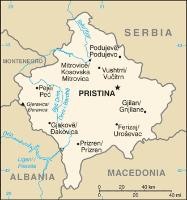On Dec. 10, the mediators responsible for managing the U.N.-supervised negotiations over Kosovo's final status reported to the U.N. Security Council that they had failed to overcome the differences separating the Serbian government and Kosovo's ethnic Albanian majority. "Neither party was willing to cede its position on the fundamental question of sovereignty over Kosovo," the mediators reported. Kosovo's political leaders then announced they would declare independence in early 2008 even without the approval of the United Nations or the Serbian government, which is prepared to offer its nominal province substantial autonomy but not independence.
At the end of the Dec. 19 Security Council session that discussed the troika report, U.S. and EU representatives issued a joint statement declaring that, "The potential for a negotiated solution is now exhausted." The governments of the United States and most members of the European Union have indicated they will recognize Kosovo's independence, probably after Serbia's presidential elections in January and February 2008, provided the Kosovo Albanians protect the rights of the ethnic Serb minority and permit considerable international supervision of their transition process." The Russian government, the Serbs' closest ally, has accused Western countries of preparing to violate international law by acting without a U.N. Security Council mandate.
Earlier this year, Russian opposition effectively blocked implementation of the recommendations on Kosovo's future offered by U.N. Special Envoy Martti Ahtisaari. His Comprehensive Proposal for the Kosovo Status Settlement did not explicitly advocate granting Kosovo independence, but it would have given the territory its own flag, anthem, constitution, armed forces, and representation in international organizations -- all features characteristic of sovereign states. Foreign Minister Sergei Lavrov called the Ahtisaari plan "absolutely unacceptable," describing it as an attempt to impose a one-sided solution to the Kosovo issue.

